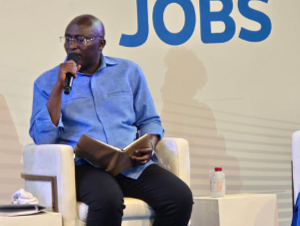The Research Scientists Association (RSA) of the Ghana Atomic Energy Commission (GAEC) has ended its three day celebrations with a call on government and major stakeholders to employ nuclear technology in pursuing reliable electricity supply and production as well as ensuring an agenda to apply nuclear technology to health care, particularly in the treatment of cancer, tuberculosis, malnutrition and a number of others.
The calls by Dr. Vincent Agbodemegbe, Manager of Localization and Stakeholder Support Center of the Nuclear Power Institute and Dr. Francis Hasford, Head of Medical Physics of the Ghana Atomic Energy Commission respectively formed part of a public lecture at the British Council in Accra on Thursday as part of the Research Scientists Association’s maiden weeklong celebrations.
The RSA with membership at the Ghana Atomic Energy Commission and the Nuclear Regulatory Authority organized the public lecture as part of the RSA week celebration 2019 themed: “Ghana beyond aid: the role of nuclear technology.’
The aim of the lecture was to educate the general public on the peaceful application of nuclear in medicine and for the generation in electricity for the country.
To ensure dependable electricity supply, Dr. Vincent Agbodemegbe called for the pursue of nuclear technology which he said was a proven means of ensuring sustainable electricity which is the key energy component that supports and sustains national growth.
To ensure the dependence on electricity as a key energy component that supports and sustains national growth, Dr. Vincent Agbodemegbe said nuclear technology was the way to go as it remained a proven means of ensuring dependable electricity supply.
Speaking on the topic, “Sustainable Power Generation, the Nuclear Position,” the Manager Of Localization And Stakeholder Support Center of the Nuclear Power Institute argued that Ghana stood a good chance of creating wealth for its citizens and growing its economy if it could deliver affordable and dependable electricity power to its citizens, adding that most countries grew their economies and became prosperous with the provision of cheap and reliable electric power to their citizens.
He urged the Research Scientists’ Association to engage the public on the benefits of Ghana going nuclear especially with nuclear opportunities providing the needed energy for development and job creation.
Dr. Agbodemegbe described nuclear technology as presenting a comprehensive resolution to ensuring the effectiveness of Ghana’s economy, especially as key sectors that facilitated economic growth relied on electricity.
Dr. Francis Hasford who spoke on the theme, “Ghana Beyond Aid: Nuclear Technology for Better Health” recounted Ghana’s history of its agenda to resort to the use of nuclear technology in treating various health conditions including cancer.
According to him, there was the need for the full coverage of cancer care in the National Health Insurance Scheme, and the full implementation of the National Cancer Control Program.
With the active working age group usually affected with cancer, Dr. Francis Hasford said the technology was an effective option in detecting and curing the disease.
He called for adequate education on and screening to detect cancer in its early stages to back efforts at achieving the Ghana Beyond Aid Agenda in the health sector, adding that there should be satisfactory numbers of medical imaging and radiotherapy centers, as well as trained professionals.
Chairman for the occasion and a Board Member of GAEC, Professor Alexander Kwadwo while acknowledging the RSA’s proximity to the Agriculture, Energy, Education and Health Ministries noted that the association’s work was critical to the development of the nation.
He described the theme as very apt as it underscored the peaceful use of nuclear technology as its works had the potential of pushing the country’s economic development.
Representing the Director General Of The Ghana Atomic Energy Commission, Director Of The Radiological And Medical Sciences Research Institute of the Ghana Atomic Energy Commission, Prof Mary Boadu said the RSA’s weeklong celebration was in response to the need for research scientists to make the findings of their work known to the public and clearly reveal their role in the development of Ghana.
According to her, research output should no longer be on the shelves of libraries nor in the laboratories.
Chief Director of the Ministry of Energy, Ing. Seth Manu who underscored the vital role energy played in every economy said one cannot talk about the economy without first talking about energy. “Energy we say is the economy and the economy is energy,” he said, adding that the development was the reason the Ministry of Energy saw the importance of nuclear and other sustainable energy.
He said the Ministry of Energy through its affiliated institution and agencies, was progressively making the required efforts at improving Ghana’s energy situation as it was closely working with all stakeholders to achieve an efficient energy mix that will power the development of our dear nation Ghana, arguing that the need for sustainable, reliable, resilient and renewable energy as base-load is critical for the country’s development.
While acknowledging that the role of nuclear energy cannot be over emphasized, the Chief Director said what Ghana needed was adequate education of the public in this regard with the assurance that the Ministry of Energy as the parent ministry driving the nuclear energy development agenda, would continue to play a leadership role by contributing to the efforts of the RSA towards achieving the necessary education and awareness through strategically planning and mobilizing resources for the attainment of the country’s collective goal.
Ghana’s nuclear journey which began in the 1960s with the construction of the nuclear reactor was designed for experimental work in the field of nuclear and atomic physics. In addition to provision of nuclear power, it was to serve as a focal point for research works involving nuclear techniques in biology, agriculture, medicine, physics and chemistry.
In health, non-communicable diseases like cancers can be managed using the nuclear technology for both diagnosis (using CT, mammography, x-rays) for treatment.
There is currently a Cancer Control Strategy which comprises prevention, early detection (diagnosis and screening) treatment and palliative care. Currently, Ghana needs to increase the number of cancer treatment centers in Ghana.
The nuclear deal is the real green deal which would provide the needed energy for industrialization, job creation which would provide the needed energy for industrialization, job creation and dealing with the climate change.
The way forward therefore is for the research scientists association to also engage the public on the benefits of Ghana going nuclear.
Business News of Sunday, 20 October 2019
Source: Michael Oberteye

















